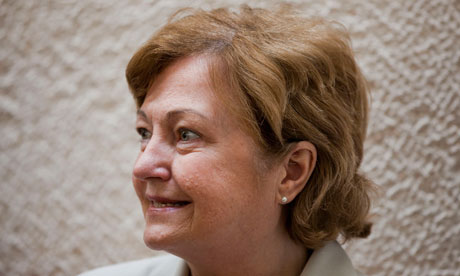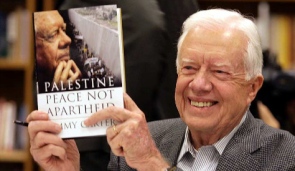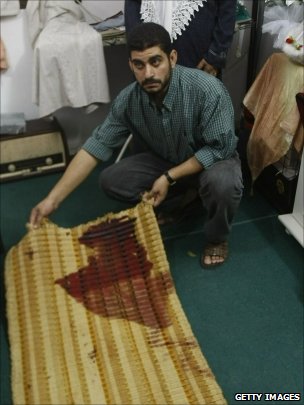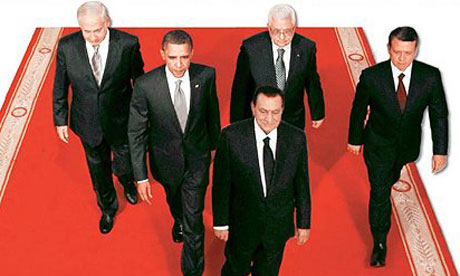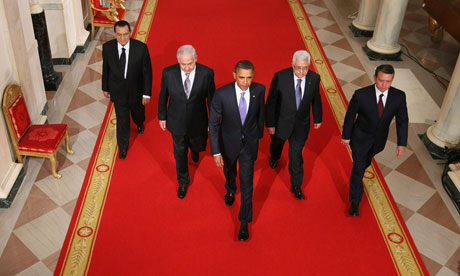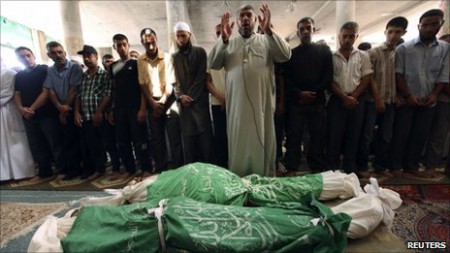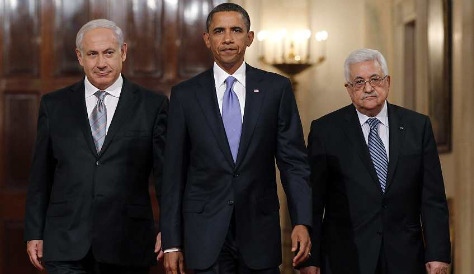EDITOR: Peace talks? What Peace talks?
Readers of international media may be forgiven for thinking that Israel and the conflict dropped off the map. From ‘intensive’ peace talk- about-talks, we have moved to total silence, and the great ship launched by President Obama, that nice man with really slick phrases, seem to have drowned without trace. Of course, this was always the most likely outcome, as this website has told you at the time, but the collaboration of international media with sinking the ship and keeping quiet about it is, to say the least, embarassing.
So it is interesting that it is the Labour Party in Israel that has noticed that the Good Ship Peace Talks is no longer sailing, and they seem quite unconfused about the reasons for it sinking…
Israel’s coalition government threatened by walk out: The Guardian
Labour party will walk out of Israel’s coalition government unless negotiations with the Palestinians get under way
Israel’s Labour party will walk out of the rightwing-dominated coalition government unless serious negotiations with the Palestinians get under way in the coming weeks, according to cabinet minister Avishay Braverman, an expected challenger to Ehud Barak for his party’s leadership.
“We need to move as soon as possible. The only way to guarantee the state of the Jewish people is to move boldly after the US election,” Braverman, the minister for minorities, said in an interview.
If Israeli prime minister Binyamin Netanyahu missed the opportunity, “Labor will not be in the coalition government. If there are the beginnings of serious negotiations, Labor stays; if not, Labor leaves.”
He also urged Barack Obama to apply himself to the issue of a Middle East peace settlement with renewed determination after Tuesday’smidterm elections. “The world needs a strong president of the US,” he said.
Labor’s departure from Netanyahu’s government could trigger its collapse unless the centre-right Kadima party could be persuaded to join. But Kadima has said it would not enter a coalition which included the rightwing Yisrael Beiteinu party led by foreign minister Avigdor Lieberman.
“Netanyahu has to make a very tough choice, but leadership is about tough choices, making tough decisions,” said Braverman. “For Netanyahu the game is now. He has to choose between sustaining political equilibrium to survive, or changing it to make history … It’s an act of bravery.”
Braverman said he had proposed, to both Netanyahu and Barak, an extension to the freeze on settlement construction for a further four to five months to give time for negotiations. The basis of talks should be the 2002 Arab peace initiative, he said – principally:
• Accepting the 1967 borders with land swaps to compensate for Israel retaining the major settlement blocs in the West Bank. Residents of settlements that would become part of Palestine would get full compensation to relocate, and “for a few thousand zealots, we’d have to apply the law”.
• Agreement on Palestinian refugees with the “total consent” of Israel and Palestine. “There would be some union of families but it won’t alter the equilibrium.”
• Jerusalem: “it can be solved”, he said without offering details.
A deal on this basis would result in “normalisation with the Arab countries and an end to the conflict”. The aim was a state of the Jewish people, with equality for all its people, and ensuring a Jewish majority for “hundreds of years”.
Netanyahu, he said, “intellectually understands everything” but must stop appeasing Lieberman, who was harming Israel’s reputation in the world and damaging the state. “I don’t know a country in the world where the foreign minister speaks against [government policy]. He should not be in the government.”
Braverman declined to confirm that he would challenge Barak for the leadership of the Labor party next year, although his name has been widely touted. But he criticised his party, which has haemorrhaged support in recent years, saying it was in the “worst position ever” and needed strong leadership and fundamental change.
“My belief is that the Labor party should not any more be the party of marginal changes … I believe in creating a party of major changes or it will become irrelevant. It can be transformed.” It must be a party of the centre, he said.
Fellow minister Isaac Herzog has already declared he intends to challenge Barak for the Labour leadership, and there are likely to be other candidates. Braverman reiterated his opposition to Netanyahu’s proposal that new citizens of Israel should swear a “loyalty oath” to Israel as a Jewish state, describing it as “stupid suggestion.” It was meaningless, he said. “Why raise this issue? To antagonise Arabs, to appease Lieberman.”
Netanyahu has yet to prove his commitment to peace: Haaretz Editorial
Two months after Washington, the PM is still using excuses to justify political inactivity, all the while playing the blame game with the Palestinians.
Today marks two months since the Washington Summit, during which the resumption of the peace talks between Israel and the Palestinians was announced. Expectations for the success of the process were low, but the pathetic result has surprised even the pessimists. The refusal of Prime Minister Benjamin Netanyahu to extend the settlement freeze has led the Palestinians to manifest their threat to pull out of the talks. Netanyahu also rejected the U.S. president’s proposal to extend the freeze for an additional 60 days in return for American security and diplomatic guarantees to Israel.
Netanyahu has reverted to the well-known behavior of using excuses to justify political inactivity, all the while playing the blame game with the Palestinians. His refusal to extend the freeze he justified as “preserving his credibility” and blamed it on coalition pressures. He claimed that “building in Judea and Samaria will not affect the peace map,” as if the settlements were not meant to establish facts which will foil the division of the land. His public proposal of a temporary freeze in exchange for a Palestinian recognition of Israel as a Jewish State appears to be a populist maneuver, and as expected, was rejected.
Netanyahu is in no rush. He is waiting for the mid-term elections in the United States tomorrow, and then to the passing of the budget in Israel. Meanwhile, he will continue wasting time with empty calls to the Palestinians to return to the negotiations, without putting forth any political initiative or showing willingness for compromise, while continuing construction beyond the Green Line. His decision to reject Barack Obama’s proposal suggests that he is preparing for a confrontation with the U.S. administration in which he will try to rally to his side the President’s rivals in Congress. His stance has already led to significant disagreement with French President Nicolas Sarkozy, who is among the most important supporters of Israel in the international community.
At the Washington Summit, Netanyahu declared that he came to make peace and not to quarrel, because “in the blame game you win but you also lose”. He is now obliged to prove himself. Instead of looking for successful excuses Netanyahu needs to freeze settlement construction and enter serious discussions on the core issues, with the borders topping the list, in an effort to reach a settlement. Otherwise, even if he wins the blame game, Israel will be the one who will lose.
Change of course: The Guardian, Letters
Friday 29 October 2010
Jonathan Freedland (Comment, 27 October) is a good man fallen among Zionists. He believes in a Jewish state. He also believes in a Palestinian state. The two beliefs are irreconcilable. His perspective on the conflict is 20 years out of date. Israel now stretches from the Mediterranean to the Jordan. In one area of that state, the Palestinians, the indigenous people, are treated as unwelcome immigrants and a demographic threat, and hedged in by discriminatory practices; in the other, they are locked into ghettos by walls, checkpoints, settlements and roads they are barred from using. In that context, the so-called peace process is nothing but a cover for entrenching the status quo. In any case, the mandate – and the credibility – of President Abbas ran out long ago. Freedland’s tangled arguments show only that, when it comes to resolving the conflict, Zionist thinking has nothing to contribute. Obama is not the only one who needs “to change course”.
Leon Rosselson
Wembley, Middlesex
EDITOR: Even better reason to boycott Israeli academia…
Those academics collaborating with Israel by going there to give presentations and deliver papers, are risking more than just their human-rights reputation, it seems…
American professor invited to Israel ‘humiliated’ by El Al security personnel: Haaretz
Heather Bradshaw, a neuroscience professor invited to a conference at Hebrew University, says she was asked to remove clothing, board the aircraft with no luggage.
An American professor who was invited to a conference in Israel claims she was humiliated by Israeli security personnel at London’s Luton airport on Thursday.
Professor Heather Bradshaw, who researches neuroscience at Indiana University, was at Cambridge University when she was invited to Hebrew University in Jerusalem for a conference.
“Our guest arrived at Luton airport on Thursday in order to fly to Israel using [Israeli airline] El Al, and she was shocked to discover that straight away, the security personnel treated her as a terror suspect,” said Haifa University professor Arik Rimmerman who submitted a complaint to El Al in her name.
“She presented numerous documents indicating the purpose of her visit and her passport – which shows she has already been to Israel several times,” said Rimmerman. “The security personnel treated her and the documents she presented with utter disrespect.”
Bradshaw told Haaretz that no one told her what she was suspected of and she wasn’t explained anything. She said that security took her to a separate room and confiscated all of her belongings. She told Haaretz that she sat and waited as every few minutes a different security official came in to question her about the items in her suitcase – which were mostly books.
After the questioning, she underwent a physical examination in which she was asked to remove her bra. The exam lasted nearly an hour, and at the end of it, she was reprimanded for holding up the flight.
Bradshaw was not allowed to bring any carry-on luggage on to the flight and was only permitted her passport and three credit cards.
When she arrived in Israel, she expected someone from the airline to wait for her and update her regarding her luggage and belongings that were left behind, but no one knew anything, Bradshaw told Haaretz. She said she felt helpless and was holding back tears.
Moreover, Bradshaw’s Israeli colleagues said that the flight attendant that was tending to her reproached her for coming to Israel without anything and without the proper permit for her luggage.
Bradshaw said it was the fourth time she had traveled to Israel and that this was the first time she was treated this way by security personnel. She told Haaretz that she had no idea why they decided to treat her differently this time.
El Al airline responded to the case by saying that “the airline acts according to the instructions of the defense authorities.”
Israel bans Palestinian PM from East Jerusalem event: Haaretz
Public Security Minister Aharonovitch issues warrant forbidding the participation of Palestinian PM Fayyad in ceremony marking PA-sponsored school renovations.
Israel is banning Palestinian Prime Minister Salam Fayyad from attending a Palestinian Authority-sponsored event in East Jerusalem, Haaretz learned on Monday.
Last week, Haaretz reported that the Legal Forum for the Land of Israel asked Public Security Minister Yitzhak Aharonovitch to prevent the planned visit with the organization’s website saying it was “committed to protecting human rights in Israel, ensuring sound government, and preserving the national integrity of the State of Israel and the Jewish people.”
Fayyad was scheduled to make an appearance on Tuesday at two East Jerusalem schools to mark the PA-sponsored renovation of 15 educational institutions in the city. The reception and ceremony was to take place in the Dahyat al-Salam neighborhood.
On Monday, however, Jerusalem policemen arrived at the Dahyat al-Salam reception hall, handing over a warrant signed by Public Security Minister Yitzhak Aharonovitch, according to which PA-sponsored events were forbidden on Israeli soil.
In the warrant, the Yisrael Beiteinu minister stated that “under the powers vested in me by section 3 of the law, I order the prevention of such an event from taking place in Jerusalem, or anywhere in Israel…as well as order anyone related to the event to prevent it from taking place.”
Palestinian eyewitnesses reported that the Jerusalem policemen told the owner of the Dahyat al-Salam hall that his place of business would be closed for a year if he went ahead with the event.
In response to Aharonovitch’s warrant, Fayyad’s office assured the event would indeed take place, only outside of the said Dahyat al-Salam hall.
According to the published schedule, the Palestinian PM is to arrive at Dahyat al-Salam at 10:00 A.M, later continuing to a another school at the Dahyat al-Barid neighborhood, situated just north of Neve Yaakov.
While both schools are located north of the West Bank separation fence, on he “Palestinian side,” they are considered part of the Jerusalem municipality, with the PA-sponsored renovations being the second such effort in recent weeks.
Recently, the PA had also sponsored the renovation of East Jerusalem roads after residents claimed repeated appeals to the Jerusalem municipality were left unanswered.
The left-leaning NGO Ir Amim said in response to the warrant that “the Palestinain Authority would not have invested in the renovation of schools and roads if it wasn’t for the neglect by the State of Israel.”
“It is regrettable that the Israeli government insists to continue its hostile attitude toward the Palestinian Authority, even at the price of collapsing East Jerusalem into poverty and neglect,” Ir Amim said.
“No chance for two states”: Interview with Knesset member Haneen Zoabi: The Electronic Intifada
Ali Abunimah, 31 October 2010
There is now “no chance” for a two-state solution in Palestine. So said Haneen Zoabi, a Palestinian member of Israel’s parliament, the Knesset, in an interview with The Electronic Intifada (EI) on 29 October in Chicago (video).
“The reality goes more toward the one state solution,” Zoabi said, “whether a democratic one-state solution, or a binational one-state solution.”
Elected in 2009, Zoabi represents the National Democratic Alliance, and is the first woman to be elected on the list of an Arab party in Israel.
“We are struggling for a normal state,” Zoabi explained, “which is a state for all of its citizens, [in] which the Palestinians and the Israeli Jews can have full equality. I recognize religious, cultural and national group rights for the Israelis, but inside a democratic and neutral state.”
Zoabi spoke to EI just before she addressed 120 students, faculty and community members in an event organized by Students for Justice in Palestine at the University of Chicago. During her lecture, and in the interview with EI, Zoabi described the systematic legal, social and cultural discrimination Israel’s 1.2 million Palestinian citizens face. Zoabi said she strongly opposes Israel’s demand to be recognized as a “Jewish state” as this would legitimize and deepen these forms of discrimination.
Zoabi was among dozens of Palestinian citizens injured by Israeli police just two days before her interview with EI. On 27 October, Israeli extremists affiliated with the outlawed Kach movement, founded by the late Meir Kahane, marched through Umm al-Fahm, a Palestinian city within Israel. Kahane believed that all Palestinians should be expelled from Israel and the occupied territories. Zoabi described how police attacked Palestinian demonstrators and protected the Israeli extremists.
She arrived in Chicago on Thursday evening, 28 October, directly from Israel with bandages on the back of her neck and lower back, where she had been struck by projectiles fired at close range. She said Israeli police used a kind of weapon which she had not seen before, which caused an intense burning sensation, and showed EI the welts beneath the bandage on her neck.
In May, Zoabi participated in the Gaza Freedom Flotilla and was aboard the Mavi Marmara when the ship was attacked by Israeli commandos in international waters. Nine activists were killed and dozens injured in the Israeli attack.
Zoabi strongly criticized Israel’s official inquiry into the incident. Although a member of Israel’s parliament and an eyewitness, Zoabi has not been asked to testify before the inquiry — called the Turkel Committee — but has attended its sessions with other witnesses. She told EI of the open bias and political statements of the committee members, stating “They do not look for the facts. They are just looking for a way to justify the Israeli attack.”
Asked about the prospects for the current US-brokered “peace process,” Zoabi said Israeli society and parliament “doesn’t feel the need for peace. They don’t perceive occupation as a problem. They don’t perceive the siege as a problem. They don’t perceive oppressing the Palestinians as a problem, and they don’t pay the price of occupation or the price of [the] siege [of Gaza].”
While Palestinians suffer intensely, Israel, Zoabi said, viewed its relationship with the Palestinians primarily as a “security problem,” which it has largely resolved through the siege of Gaza, the separation wall in the West Bank, and by “security coordination” with the Palestinian Authority.
Zoabi spoke about the global boycott, divestment and sanctions (BDS) movement which aims to pressure Israel to end its occupation and other human rights abuses against Palestinians, and to respect international law.
While she said the effect of BDS within Israel was still marginal, “this kind of campaign has the power raise the debate inside the Israeli society and inside the Knesset.” Israel, she said, “is so sensitive to international criticism and a situation of isolation.”
Even if BDS did not yet have much impact on Israel’s economy, it “can send a political message to the Israelis that we cannot just continue with the occupation, and continue with the siege and with oppressing the Palestinian people without the Israeli society paying a price.”
During her visit to the United States, Zoabi addressed the US Palestinian Community Network’s second Popular Conference for Arabs and Palestinians in the US and is scheduled to speak in the San Francisco Bay Area before returning home.
The head of the Forum for the Land of Israel, Noci Eyal, applauded the move to block Fayyad’s participation, saying the organization was happy “that our appeal regarding this issue was accepted by the minister.”
“Now it must be checked how the PA was allowed to renovate schools in the capital, and whether it is taking other illegal steps,” Eyal said, adding that the PA “mustn’t be allowed to intervene in the renovation of roads and public structures – it is against the law and an injury to Israel’s sovereignty.”
